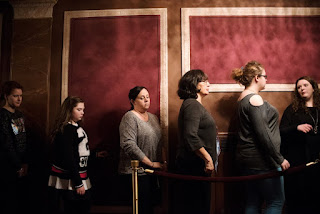Introverts Rushing to the Restroom Inadvertently Make a Line, Are Forced to Socialize With Each Other
It was a Sunday morning like any other at the First Reformed Baptist Church of Des Moines. The pastor had just finished his sermon and invited the congregation to greet each other with a handshake and a smile. For most people, this was a welcome opportunity to catch up with friends and make new ones. But for some, it was a nightmare.
A group of introverts, who preferred to avoid small talk and social interactions, quickly made their way to the restroom, hoping to escape the awkwardness of greeting time. They thought they had found a safe haven, where they could hide until the coast was clear. But they were wrong.
As more and more introverts flocked to the restroom, they soon formed a long line outside the door, much to their dismay. They realized that they had no choice but to face each other and make conversation, something they dreaded more than anything.
Some tried to look at their phones or pretend to be busy, but others felt obliged to say something. They exchanged polite but strained greetings, such as “Hi”, “How are you?”, and “Nice weather we’re having”. They asked each other generic questions, such as “What do you do for a living?”, “Where are you from?”, and “How long have you been coming to this church?”. They nodded and smiled politely, but secretly wished they could be anywhere else.
One introvert, who identified himself as John, said he regretted his decision to go to the restroom. “I thought it would be a quick escape, but it turned out to be worse than greeting time. I had to talk to so many people I didn’t know or care about. It was exhausting.”
Another introvert, who wished to remain anonymous, said she felt trapped in the line. “I couldn’t just leave, because that would be rude. But I also couldn’t stand there and pretend to be interested in what they were saying. It was torture.”
The pastor, who noticed the long line outside the restroom, said he was surprised by the phenomenon. “I didn’t realize we had so many introverts in our church. I thought they were all friendly and outgoing. Maybe we should have a special ministry for them, or something.”
He said he hoped that the introverts would eventually overcome their shyness and join the rest of the church in fellowship. “We are a family here, and we want everyone to feel welcome and loved. We don’t want anyone to feel left out or isolated.”
He also suggested that the introverts should try to see the positive side of greeting time. “It’s a great way to meet new people and share your faith. You never know who you might bless or who might bless you. God works in mysterious ways.”
Meanwhile, the introverts were still waiting in line for the restroom, hoping that greeting time would end soon.

Comments
Post a Comment